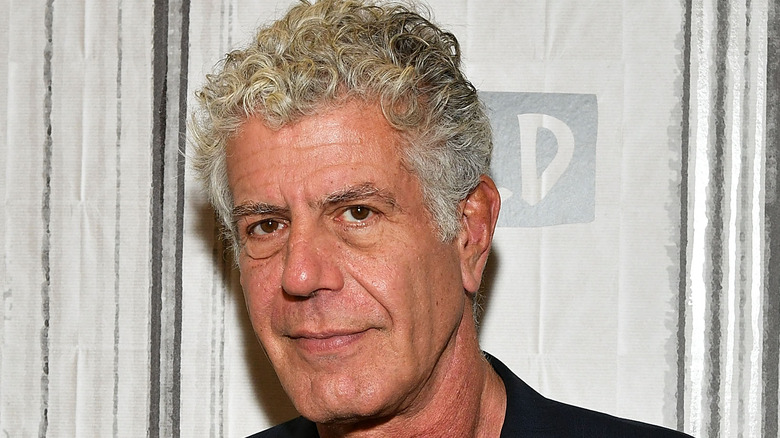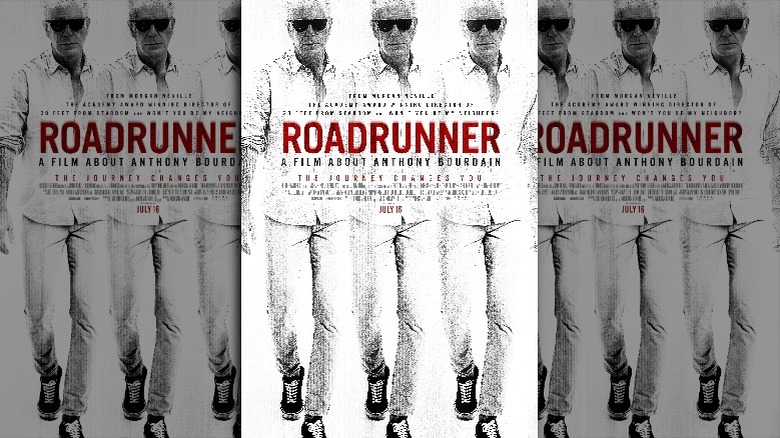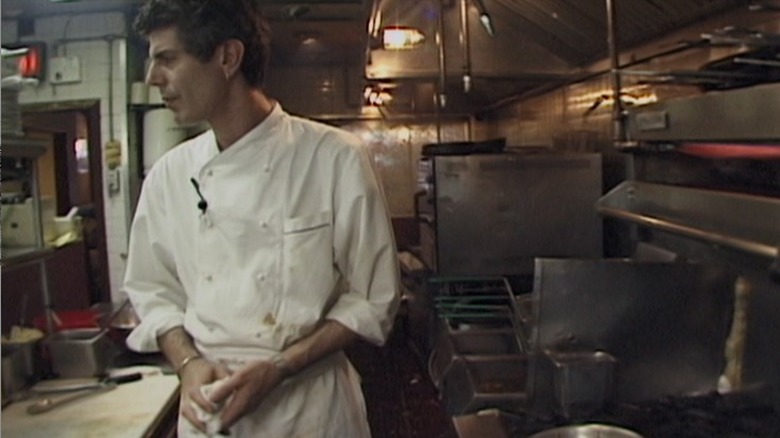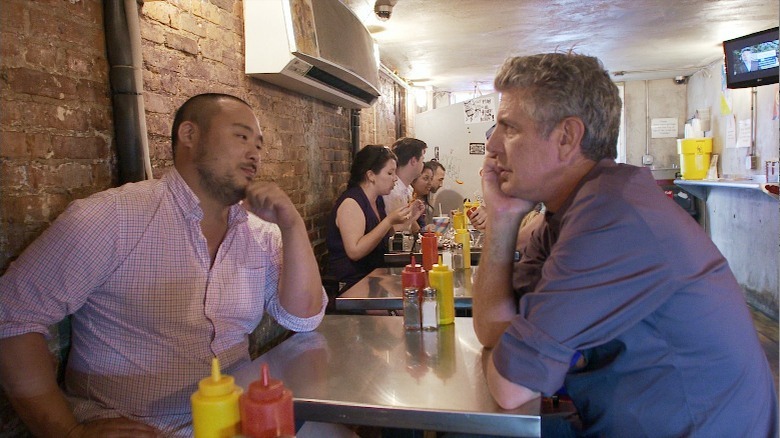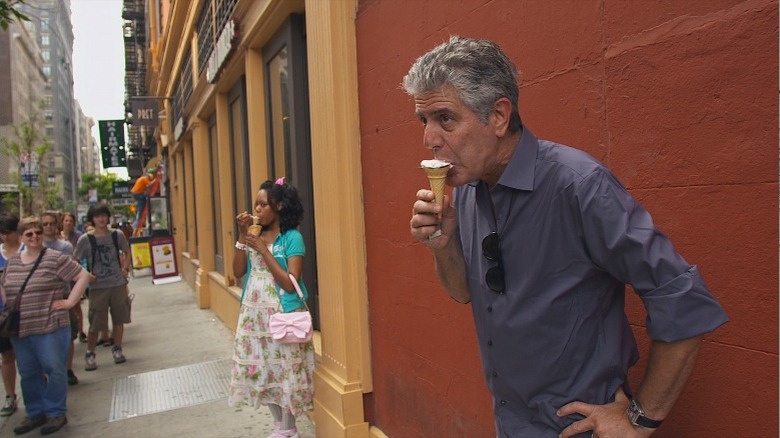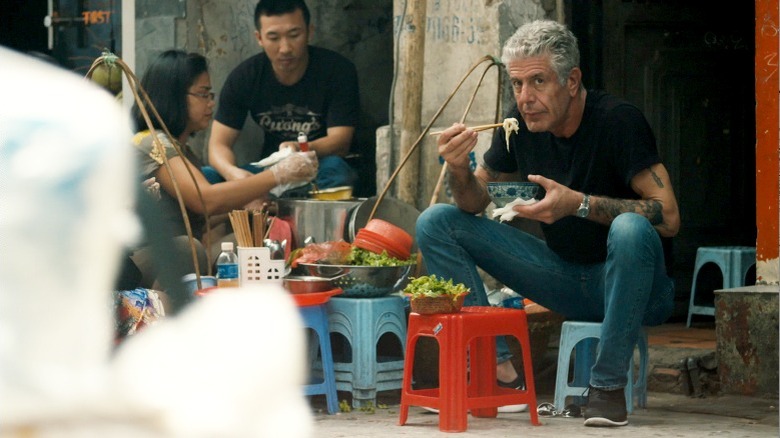Roadrunner Director Morgan Neville Opens Up On The Film And Anthony Bourdain - Exclusive Interview
The tragic loss of Anthony Bourdain in 2018 is still fresh for many fans of the writer and award-winning television host. He traveled to unexpected ends of the Earth and opened the eyes of his viewers to the hardships experienced around the world while imparting fundamental truths that connect all of humanity. From the outside, so many were unaware of his pain and the struggles he faced, which made his suicide all the more surprising.
Three years later, director Morgan Neville is releasing his latest work, "Roadrunner," which centers on the lesser-known life of Anthony Bourdain. Mashed was fortunate enough to sit down with the director for an exclusive interview to discuss the documentary and misperceptions surrounding Bourdain. From Bourdain's earliest days as a chef to the trauma of losing him, Neville spent two years exploring his world, both before and after his death. Neville also opened up to Mashed to share some of those insights prior to the premiere of the film on July 16.
Morgan Neville discusses his choice to make "Roadrunner"
Can you tell us a little bit about the inspiration behind the documentary and what drew you to the project?
Anthony Bourdain is one of the most... an international man of mystery. And he was somebody who I always was interested in. I felt like he was kind of a documentary filmmaker himself and always talking about why culture connects us. I felt a real kinship with him. He was one of the most influential voices in fighting for the power of curiosity and advocating for those things. And when he died, I just felt like, yeah, it was a personal loss for people, for fans and for people who knew him, but that it was also a loss for a society, without sounding too grand about it, but that he really did have an impact with what he was doing, even though he would deny it. I think seeing how people reacted after he died is testament to just how deep his influence ran.
Morgan Neville on Anthony Bourdain as an author
He clearly had given a lot of thought to writing as a craft prior to "Kitchen Confidential." How do you think that impacted his voice as an author and as a personality?
Oh, he actually didn't really like to be called a chef, or TV personality, he hated. He liked to be called a writer, and I think he really fundamentally saw himself always as a storyteller, and he wrote a lot. He started writing. I actually read some short stories he wrote in college, and he wrote three mystery novels. He wrote a lot and he was really good at it. So in a way, I think that was the thing that he was always proudest of, and something I was trying to kind of channel as much as I could in what we were doing. So "Kitchen Confidential" seemed to come out of the blue, but, again, it was somebody who had put in years and years of writing before that book came up.
"Roadrunner" explores Anthony Bourdain's impact on the culinary world
He impacted how so many people view food, whether it was restaurants or while traveling. In what ways do you think "Roadrunner" will prompt viewers to see food again?
Well, I feel like Bourdain kind of kicked off the reevaluation of the balance of high food and low food, that he came from a world of where he understood French cuisine, and he went to the Culinary Institute of America and he could appreciate the finest Michelin star dining, but he's the guy who really got people excited about eating out of carts on streets and third-world countries. And now, there's been such a revolution in how we think about ethnic food and respect it, what actually constitutes value in a meal. And I think he was there pushing that more than anything, and that's not a small thing, the fact that people can take Laotian and Thai food seriously, say, in terms of cuisine or Indian or Sichuan, or all these things that now people write articles about and they get reviewed very seriously, but 20 years ago that, that was not happening.
And so, that's part of it that I feel like that was Tony's message. And as much as the film reflects that part of it, I am 100% on board because Tony was always for the little guy. I think he always kind of saw himself as an underdog. And so, I think if the film helps extend that message, that it's the people we don't necessarily value, they have stories and cultures that are just as valuable as any other. So anyway, I hope people take that away.
Morgan Neville shares the lessons he learned from making the film
What was the most challenging component of creating this film?
There was so much grief in the wake of his death. And me, I started the film maybe 16 months after he had died and I worked on it for two years, so almost two years. So it was a lot of just trauma to deal with, whether, in interviews or conversations or just thinking about it, it's just f***ing heavy. It was hard, which is not to say that's not the job I signed up for. It was, but that was the hardest challenge in making it.
What's the most surprising thing you learned about him while working on this project?
I think how shy he was, kind of. He could be ... kind of intimidating in a way, but I think a lot of it had to do with just his own shyness and being uncomfortable around people. And when he would be in public situations, he would always tell his friends, "You can't leave my side and I, I need somebody to be there with me," because at the same time, he was one of the great raconteurs and one of the funniest people ever, so I just didn't see that coming, that he was really that kind of shy inside.
And I kind of feel like that shyness later became related to the kind of agoraphobia he had later, that he was not somebody who actually loved to be in the street talking to strangers, but he would always do it. I think he always felt like he was getting away with something by having the success he had. He never felt he really deserved it. Many people told me that. He had imposter syndrome and I feel like those kinds of insecurities were kind of always there. And that's just something I couldn't see, what just watching the shows as a fan.
The lasting impression of Anthony Bourdain that Morgan Neville hopes to leave with "Roadrunner"
Without giving away spoilers, can you speak to that closing sequence and what you hope viewers will take away from it?
Well, I think Tony was always about upsetting expectations and pushing boundaries. And when the idea came up to kind of blow up our ending, I felt like Tony gave us permission to do that. So yeah, we did do a kind of an art stunt that in a way to kind of to challenge or deface or blow something up, that there are no sacred cows. That's such a Tony sentiment. It's basically, we want to do an artistic version of what he says at the beginning of the film, which is if we can use him for entertainment purposes, go do it. We didn't feed his body into a wood chipper and spread it around Harrods at rush hour, as he suggested. But it was just that kind of idea, kind of big, bold moves are also to be respected. Playing it safe is not the way to go with Bourdain.
Be sure to catch "Roadrunner," opening in select theaters on July 16.
